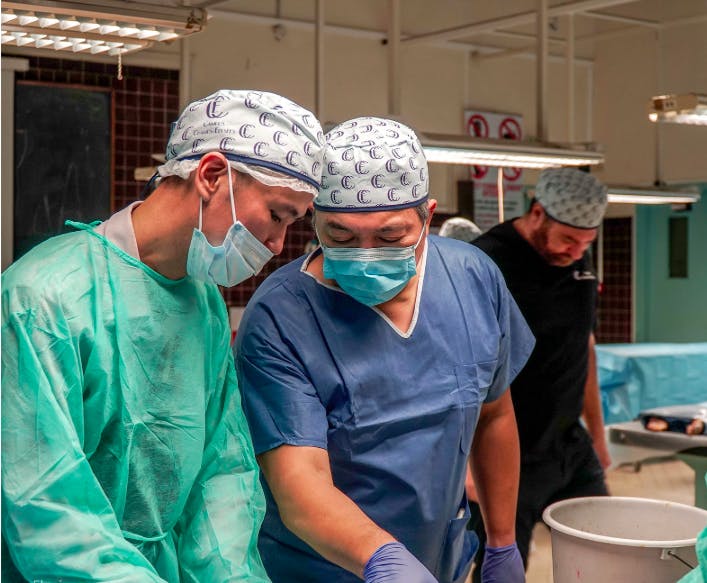Invivox speaks to Dr Philippe Levan, one of the french pioneers on buttock surgery. Dr Philippe Levan, will be co-hosting this the second edition of « buttock lipofilling & prosthesis masterclass » with Dr Gilbert Zakine and Prof. Michael Atlan. The course will be held on May 28th,29th & 30th at Campus Champs-Elysées – Paris.
INVIVOX: Why did you become one of the trainers at the Campus Champs-Élysées?
Dr Levan – The desire share my skills and knowledge with others. Having worked in both the public and and the private sector, when I was approached to train young surgeons my response was ‘Of course’. Buttock surgery isn’t a subject that is widely taught, even in the academic world. There aren’t very many places available for students to learn these techniques.
INVIVOX: Do the postgraduate training offers at Campus Champs-Élysées meet the training needs?
Dr Levan - Campus Champs-Elysées definitely meets the needs definitely. It has good infrastructure, is ideally situated and represents the major names of French Aesthetic Surgery. It has an international reputation. In France, we don’t have enough these types of courses. They are often reserved for residents, our future surgeons. Once established, they have a limited training opportunities and even less hands-on experiences. Buttock surgery is the perfect example.
Check out the upcoming Buttock Lipofilling Masterclass now and train alongside Dr . Phillipe Levan himself
INVIVOX: Why is buttock surgery such a closed circle?
Dr Levan – When I started about fifteen years ago this surgery was unofficial. I was self taught. In 2003, the Brazilian Raoul Gonzalez came to the French Society of Plastic Surgery to talk about buttock implants. After the congress, I did an exchange with him. That’s how I started.
« Although I encountered some people along the way, I had nothing like the kind of support and help that Michael Atlan, Gilbert Zakine and I provide today in the context of Campus Champs-Elysées Master Class. I really would have appreciated having this type of training available to me. I am proud to share my 15 years of experience with both experienced and budding plastic surgeons. »
INVIVOX: Can you tell us more about buttock area, technique of laying prostheses antogenous fat grafting?
Dr Levan – This area is scary! It is not like the breast which has a much simpler anatomy (mammary gland, pectoral muscle). There are some big vessels and nerves that are vulnerable to damage. It looks simple, but we really do need to be careful. In fact, if the precautions or prophylactic measures are not respected, we can have some big problems.
As far as the loge dissection for implant’s placement, it is necessary to have strong anatomical bases. Regarding the use of lipofilling, there are more and more accidents because surgeons are starting without having any experience or are using increasingly higher volumes of fat. The ultimate risk with fat is the fat embolism. There are also other complications that can arise. The dissection day is very useful because we highlight the most dangerous points. Trainees can see and learn to dissect the anatomical danger zones, but in a controlled environment.
« We are there to explain that if you take all precautions and if you avoid dangerous areas, you can operate safely. "
INVIVOX: Why buttock surgery isn’t more taught?
Dr Levan - Perhaps because there isn’t a huge demand for it Europe, and few surgeons are familiar with the use of prosthetics. In the last 3 years there has been a rise of lipofilling, and a significant increase of demand for augmentation of the buttocks. There are many augmentation techniques : fat injection, implants, but also hyaluronic acid. We do not advise using HA as it can be absorbed, it is both expensive and not without risks. All these aspects are studied in the course.
INVIVOX: What is the trend: prosthesis and/or implant?
Dr Levan – The trend is to use lipofilling rather than prosthesis (75% lipofilling).
From a personal point of view, the best procedure is a composite procedure. During the same surgical operation, there is liposuction, fat reinjection and placement of prostheses. Prosthesis isn’t required for small augmentation but the question then arises for significant enhancement. Very slim patients (those who have advanced cachexia, chronic disease, cancer, lipoatrophy, posttreatment etc.) should not have lipofilling due to the an as they lack the sufficient quantity of fat. Implants can improve comfort in the sitting position and create a pleasing silhouette for the patient.
INVIVOX: What type of implants do you use?
Dr Levan – We use smooth and firm prosthesis due to their friction and pressure.
In the “tip & tricks”, we explain how to deal with the difficulty of introducing the implant. And how to find the perfect compromise between the smallest incision in regards of the implant’s sizing and rigidity. It’s often this technical passage which discourages surgeons.
INVIVOX: How does the training work?
Dr Levan – There are around 10 or 15 surgeons from all around the world, so we know each trainee individually.
Before each workshop there is theoretical training through lectures. The practice session with dissection on corpses is takes place at University of Medicine (rue des Saints-Pères) in which we concentrate on putting the theory into practice. We finish with some « live surgery ». Exchanges between surgeons are at the heart of the training system.
INVIVOX: What is the profile of trainees?
Dr Levan – 90% of them are beginners.
INVIVOX: What are the benefits for participants?
Dr Levan - The idea is to present the technique in the simplest way that we can.
If surgeons follow exactly what was said and shown after these 3 days, they will be able to perform it independently themselves.
INVIVOX: After the training, do you keep in touch with your colleagues?
Dr Levan - We continue to exchange via a WhatsApp group.
We provide a remote assistance to help them during their first surgery: on the preoperative, the choice of prostheses, the type of incision etc.
To medical mentoring and beyond!

